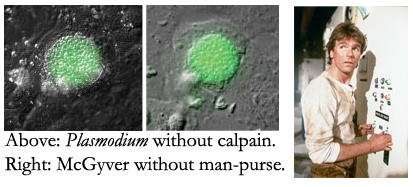Plasmodium protozoans are the cause of malaria. In their final vertebrate host, a protozoan infects a red blood cell to replicate itself. After replication, the daughter protozoa use an enzyme called calpain to digest protein bonds in the cell, freeing them from the cell membrane. Obviously, this kills the cell. Exponential cell death causes malaria’s anemia-like symptoms.
Until recently, scientists assumed that parasites like Plasmodium and other apicomplexan parasites manufactured their own enzymes to escape from a dying host cell. Doron Greenbaum and a team at Penn knew this might not be the case when they tried to stain for this enzyme; calpain was easily identified in the host cell, but couldn’t be found in the Plasmodium.
When the researchers designed a cell line that contained no calpain, plasmodium could infect and replicate with no trouble. But this roach motel red blood cell wouldn’t let the new paramecia out. Without available enzymes to scavenge, the cell membrane became a parasite prison. Reintroducing calpain to the cell caused a jailbreak, reinstating the infection cycle.

Calpain’s role in the cell isn’t perfectly understood. It is thought to play a role in cell migration, and it also appears to have some role in cell apoptosis, the controlled suicide of cells. If Plasmodium has been borrowing our calpain, there’s a good chance that a host of other parasites have been doing the same. Greenbaum’s team knows of at least one. When they blocked the calpain of toxoplasma-infected cells, the Toxoplasma gondii parasite was trapped in the same way as Plasmodium.
Most of our malaria-fighting strategy involves the prevention of infection: pesticides, nets, preventative drugs. Plasmodium’s protease scavenging habit introduces a brand new strategy in the fight against the malaria endemic. The researchers hope to use membrane-cleaving enzymes as a new target for malaria drugs. If they can find a way to greet Plasmodium with an intramembrane scorched earth, then an infection can be easily contained. Since the parasite is using MacGyver tricks, these new drugs would stop malaria the same way you stop MacGyver: take away any potentially useful items.
"Apicomplexan Parasites Co-Opt Host Calpains To Facilitate Their Escape From Infected Cells". Rajesh Chandramohanadas et al; Science: 10.1126/science.1171085 (pre-published in Science Express)





Comments